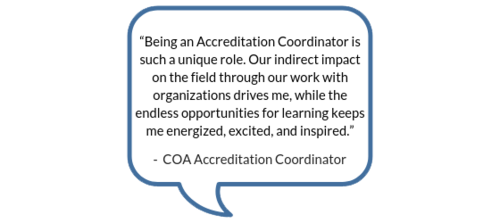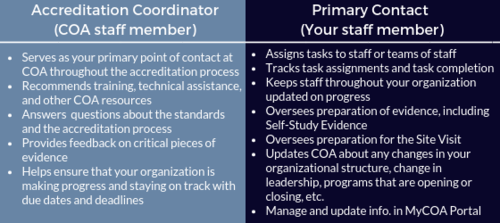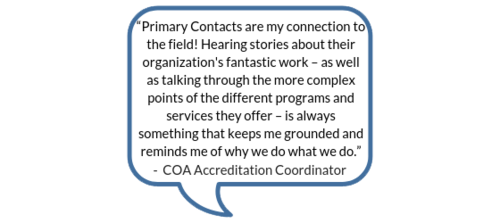Accreditation is a journey. One with a clear destination, but a less defined path. There are mile markers along the way; however, there isn’t necessarily one straight, easy road to the finish line. Is there a recommended route? Are there any anticipated hurdles? If you are tasked with leading the accreditation process for your organization, you may not know where to start. This is where COA’s Accreditation Coordinators come in.

Every organization seeking COA accreditation is assigned an Accreditation Coordinator, a COA staff member that serves as a single point-of-contact throughout the accreditation journey. The role of the Accreditation Coordinator is unique to COA’s facilitative accreditation process. They work closely with the organization’s designated single point-of-contact, which COA refers to as the Primary Contact. Through this partnership, an organization obtains the support they need to navigate the road ahead.
Roles and responsibilities
Accreditation Coordinator
An Accreditation Coordinator works concurrently with a number of organizations. Their caseload can vary as well as the needs of each organization. The coordinators can also specialize in distinct accreditation programs or service types (Financial Education and Counseling, Employee Assistance Programs, Opioid Treatment Providers, etc.). Communication is a key element to this role. They’re responsible for answering questions, providing feedback on submitted documentation, and referring organizations to training and resources. Whether it’s to discuss specific documentation, standards, practices, or policies, they’re available on a daily basis to address inquiries from organizations. And because each organization comes with unique questions and circumstances, researching program models and administrative practices is also part of the work.

While the day-to-day routine of an Accreditation Coordinator involves providing tailored support to organizations, it is also valuable to note the role’s limitations. Accreditation Coordinators are not consultants and do not provide consultation to organizations. They can help Primary Contacts interpret the standards and answer questions, but are unable to dictate how implementation will look on the ground. Organizations are responsible for the application of the standards. And while they review and provide feedback on select pieces of evidence, specifically six key documents referred to as the Preliminary Self-Study (PSS), it is not within their role to review the entire Self-Study (aka all of the evidence that is required based on the assigned standards). The Site Review Team assesses the Self-Study prior to the Site Visit and will provide the ratings after conducting the on-site review.
Primary Contact
The Primary Contact is COA’s champion at the organization level and is in charge of spearheading the accreditation process. In this role, they’re responsible for engaging organization staff in all things COA. While the Primary Contact is the single point-of-contact, accreditation is by no means a one-person job. Accreditation is a huge team effort, from pulling together Self-Study evidence to preparing for the Site Visit, and the Primary Contact is the team captain. It’s no coincidence that we have repeatedly heard the role compared to “herding cats”!

Exploring the relationship between the Accreditation Coordinator and the Primary Contact
COA’s mission is to partner with human service organizations worldwide to improve service delivery outcomes by developing, applying, and promoting accreditation standards. The relationship between the Accreditation Coordinator and the Primary Contact brings that partnership to life. The two work together throughout the accreditation process, from start (the intake call) to finish (the notification of accreditation). They’re there to kick off the expedition, advise you of the twists and turns, help navigate roadblocks, and ultimately make sure your organization hits all the necessary milestones en route to the final destination. Along the way, Primary Contacts should provide the Accreditation Coordinator with updates on their progress, highlighting successes and challenges. That information helps COA gauge the organization’s strengths and needs and informs the provision of targeted supports.
Learning about the challenges of navigating the process is vital to COA. We want to know about the unexpected obstacles in order to assist with readjusting your approach and preventing you from spiraling off course. For example, Performance and Quality Improvement (PQI) can be one major hurdle for organizations. As the Primary Contact it can feel daunting to try to implement a culture of PQI, especially if your organization doesn’t have the framework in place. As an Accreditation Coordinator, some of my favorite moments working with Primary Contacts have come from discussing the evolution of PQI. It could be talking through the development of a PQI committee (“Who should be on it?” “How often should they meet?”) or figuring out performance and outcome measures (“Can you explain outputs and outcomes again?” “What are some examples of operations and management performance measures?”). Standards and technical assistance inevitability guide the conversation, but it’s through this exchange that we learn how an organization goes about creating change. And isn’t that what it’s really all about? PQI helps an organization become stronger to better serve their clients and community.

The relationship between the Accreditation Coordinator and Primary Contact is not one-size-fits-all. We are there to support in whatever capacity is most beneficial for the organization. For some this may take the form of structured monthly check-in calls, while others prefer Q&A exchanges over email. We recommend that organizations new to the accreditation process or new to the role of Primary Contact have more regular communication with their Accreditation Coordinator. Seasoned individuals may not need to rely on their coordinator as much; they remember the journey and have their path mapped out. Regardless of the frequency of contact, the door for communication is always open.
Tips for Primary Contacts
We know that serving as the Primary Contact is not an easy task. Often the work of accreditation is piled onto an already full plate. Here are some tips and tricks from COA’s team of Accreditation Coordinators:
- Use your Accreditation Coordinator as a resource. If you feel stumped or confused, don’t hesitate to reach out to your Accreditation Coordinator. Ask questions, it is what we are here for! That said, sometimes we get such excellent (and complex) questions that we need to consult with the team or the Standards Development department, which requires additional time. So it may take us time to get back to you with a response, but don’t worry; we will get back to you as soon as possible.
- Send us an email or schedule a call. The Accreditation Coordinator’s daily responsibilities are often collaborative – meeting frequently with organizations, our team, and other COA colleagues – which can sometimes impact our availability. We know Primary Contacts have busy schedules too. No one enjoys playing phone tag, it is best to schedule a call or send us an email. Our typical response time is 24 to 48 hours.
- Become friends with the MyCOA portal. We recommend that all Primary Contacts (and staff working actively on the process) participate in one of the regularly scheduled Intake Webinars in order to review all of the portal’s features and functionality. We don’t want to brag, but it is pretty cool! We encourage you to get familiar with the portal since this is where you will be completing the majority of the work. Check out the Step Pages, search for tools, and click all the buttons! Well not all the buttons.
- Attend a COA face-to-face training. There is no better way to familiarize yourself with all aspects of COA than attending either the in-person 2-day Intensive Accreditation Training or 1-day Performance and Quality Improvement Training. These in-person trainings provide Primary Contacts with an opportunity to learn from COA subject matter experts, meet COA staff and network with other organizations. We recognize this might not be a feasible option for all organizations due to limited resources and capacity. Therefore, we also offer a variety of complimentary live webinars and self-paced trainings covering similar curriculum. You can learn more and register through the Training Calendar.
- Don’t panic! This might be the most important tip on this entire list! The accreditation process is meant to be rigorous, but achievable. The goal is that you end the journey stronger than when you started. Change doesn’t happen overnight and it isn’t always easy, however, it is possible. The best advice for Primary Contacts is to not get overwhelmed; take the process one step at a time. Creating a work plan and communicating expectations to your team (don’t forget to enlist their help) is a good place to start. Have fun with it too! We have seen many primary contacts tap into their creative sides to invent games or enjoyable activities to get their team on board the COA train.
Training and resources
Want to know how to create a policy? We have a tip sheet for that! Want to know how to develop a strategic plan? We have a template (along with a self-paced training and blog post) for that! We’ve included just a few of the many resources that can help organizations on the road to achieving COA accreditation. We recommend exploring the full breadth of resources by accessing the tool search in the MyCOA Portal.
- Accreditation Learning Plan
- Getting Organized: Creating an Accreditation Workplan
- Preliminary Self-Study Fact Sheet
- Three-Part PQI Recorded Webinar Series
- PQI Tool Kit
- Preparing for the Site Visit
You are not alone
Many of us at COA have a social work (or social work adjacent) background, and the work we do to support Primary Contacts in their efforts to create change in their organizations, mirrors the work organizations do with their clients. We conduct an assessment. We create a service plan. We deliver supports and linkages to necessary resources. The makeup of our caseloads may be different, but we are all working towards a common goal – positive client outcomes and high quality services.
And as you learn from us, we learn from you. You are the change makers, advocating for those that you serve and making an impact on your communities. For many of us, the stories that you share and the work that you do are why we walk through the doors at COA. You are our direct connection to the field. Our collaboration allows us to gain a better understanding of service delivery and program models, as well as how the implementation of best practice looks on the ground for organizations of all shapes and sizes.
At the end of the day, an organization is ultimately responsible for their accreditation process, however, you are not alone on the journey. COA’s Accreditation Coordinators are there to support you and your team.
